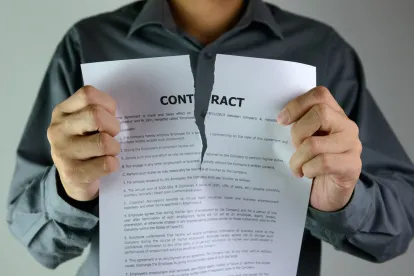Usually found towards the end of a commercial contract, a force majeure provision seeks to exclude the liability of one or more parties for events beyond their reasonable control.
Often (and mistakenly) overlooked as “standard boilerplate”, the increasingly apparent and potentially extensive impact of the Coronavirus outbreak on global supply chains is likely to bring such provisions into sharp focus over the coming weeks and months.
So a timely reminder seems in order of the top ten issues to be aware of for anyone seeking to rely on force majeure protection or who is at the receiving end of a force majeure defence.
No implied protection for force majeure events: absent specific contractual provision, English law will not by default protect a party from liability due to events beyond their control – if a party wants such protection then they are expected to reserve it for themselves in the relevant contract.
The exception to this rule is the doctrine of “frustration”, where it may be possible to set aside a contract in its entirety if an unforeseen event renders that contract impossible to perform or radically changes its underlying purpose. However, the threshold for a successful frustration claim is high and the fact that a contract has simply become more difficult or expensive to perform is unlikely to be sufficient.
No recognised definition of “force majeure”: unlike many other common legal phrases (“time of the essence”, “reasonable endeavours”, “material breach” etc.), there is no generally accepted or implied definition of “force majeure” so if tested, a provision excluding liability due to simply “force majeure” is unlikely to stand up to scrutiny.
As such a contract is expected to define on a case by case basis what the parties mean by force majeure, whether that be by reference to specific types of events (fire, flood etc.) and/or by reference to unspecified events which are generally beyond the reasonable control of a party.
Provisions most likely to succeed in the context of the Coronavirus outbreak are those which specifically name check disease or envisage such an outbreak.
The devil is always in the detail: unless there is very good reason not to, English law will always look to hold the parties to the precise detail of what they have agreed, applying a plain English/dictionary definition approach to interpretation where no specific contractual definition exists.
Too often terminology will be used in a contract without any thought or appreciation as to what that actually means in practice.
Force majeure provisions which refer to “pandemics” or “epidemics” are only likely to succeed if the World Health Organisation designates Coronavirus as such. Isolated or limited outbreaks of a disease wouldn’t therefore be caught by expressions such as these.
Follow the process: more robust force majeure provisions usually require the party seeking to benefit from protection to follow a prescribed process, often requiring formal notice to be served as soon as that party becomes aware of the existence of a potential force majeure event.
For a party wanting protection following any such process is critical – as a recent case on non-compliance with a contractual process for service of formal notices has shown, if a contract specifies a procedure which is to be followed in given circumstances then the English courts will expect the parties to follow that process. If it isn’t followed, then there is a risk of jeopardising any subsequent claim for protection.
Cause and effect: a party cannot use contractual force majeure protection to escape liability for a breach which would have occurred in any event or which was not actually caused by a force majeure event. In order to claim protection, a party must be able to demonstrate if challenged a direct causal link/impact between the force majeure event in question and that party’s inability to perform.
Maintain evidence/an audit trail: during the panic of dealing with a force majeure event it is all too easy to forget record keeping and admin however, creating and maintaining a proper evidence/audit trail can be invaluable in the event of a subsequent dispute or litigation.
For example, if multiple potential alternative suppliers have all indicated an inability to supply due to Coronavirus, obtain and retain written confirmation of that; similarly, if suspicious of a supplier claiming force majeure protection can you collate evidence that the affected supply is obtainable elsewhere in the market, even if at a higher price?
Actions have consequences: rather than simply excluding liability, claiming protection under more robust a force majeure provisions will usually trigger rights and remedies for the other party – typically the option to terminate if non-performance due to that event continues for an extended period and/or the suspension of any contractual exclusivity.
These risks should always be factored into the decision as to whether to claim force majeure protection. For example, would claiming protection allow a customer to escape early an otherwise profitable long-term arrangement? Would the cost of complying with contractual obligations triggered by a claim of force majeure (such as implementing business continuity or disaster recovery measures) exceed the cost of temporarily implementing more expensive local supplies?
The short-term benefit of claiming force majeure protection may not always outweigh the risk of longer term consequences. As ever, thinking before acting is key.
More than one way to skin a cat: when confronted with a specific circumstance the temptation is to look only for corresponding specific contractual provisions. However, a contract which is silent or unhelpful on force majeure may well contain other helpful general provisions.
Good examples of this include a right to terminate for convenience on notice (which then avoids a dispute over whether Coronavirus is or is not a force majeure event); a contract which does not oblige a customer to purchase exclusively from a supplier (meaning that customer is free to source elsewhere without the need to give a non-performing supplier reason or to terminate the underlying contract).
Different rules for consumers: a business supplying to consumers (as opposed to other businesses) will only be able to rely on force majeure protection which satisfies the Competition and Markets Authority’s requirement for fairness and transparency when dealing with consumers.
In practice that means avoiding the use of overly “legal” phrases such as “force majeure” in consumer terms and conditions (“events outside of our control” is generally preferred) and limiting claims for protection only to where a business has genuinely been unable to perform as a direct result of force majeure events.
It’s good to talk/we’re all in this together: many of the leading cases on force majeure arise as a result of specific events which affected only one party (a building burns down, a ship sinks etc.), whereas Coronavirus is headline news and has the potential to affect many businesses at all stages of the supply chain.
As such an affected business may find customers and suppliers more willing than normal to adopt a “we’re all in this together” mind-set when formulating solutions, so simply picking up the phone could be a very workable solution in these circumstances.
That said, care needs to be taken in any such discussions to avoid goodwill gestures coming back to haunt you or lead to the loss of valuable contractual rights and protections.




 />i
/>i

